外研版(2019)选择性必修第二册 Unit1 Growing up- Developing ideas—reading 课件 (共48张PPT)
文档属性
| 名称 | 外研版(2019)选择性必修第二册 Unit1 Growing up- Developing ideas—reading 课件 (共48张PPT) | 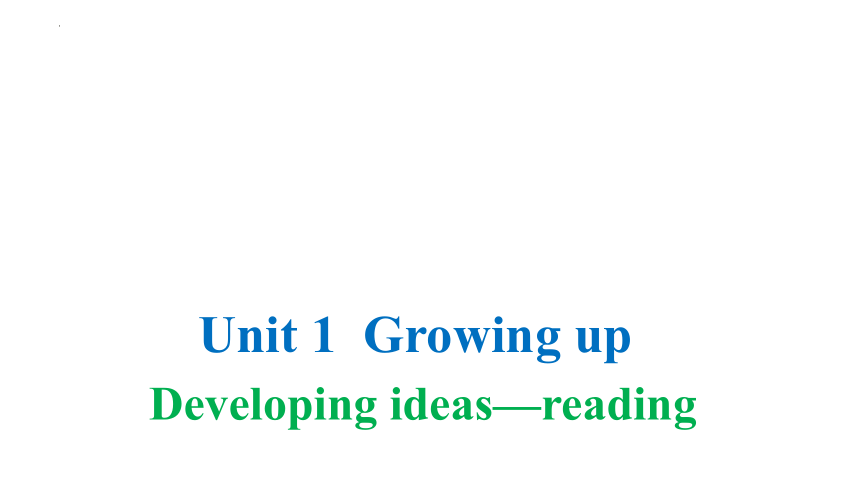 | |
| 格式 | zip | ||
| 文件大小 | 1.4MB | ||
| 资源类型 | 教案 | ||
| 版本资源 | 外研版(2019) | ||
| 科目 | 英语 | ||
| 更新时间 | 2022-07-05 16:47:17 | ||
图片预览

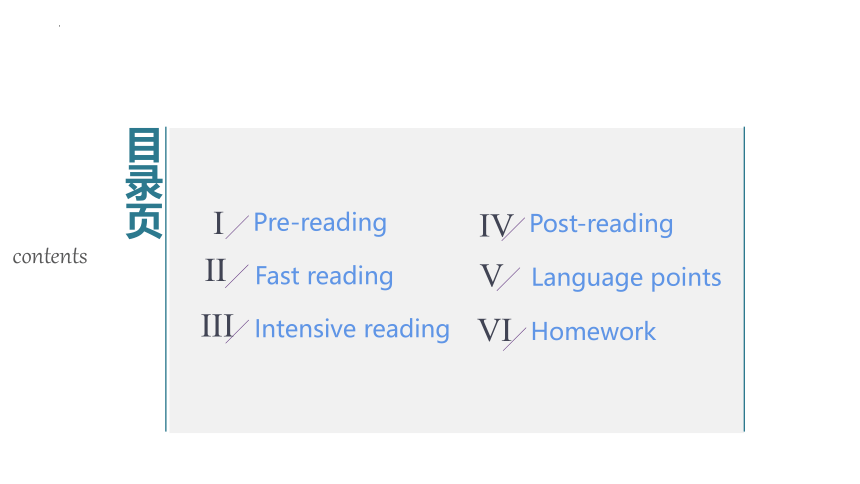
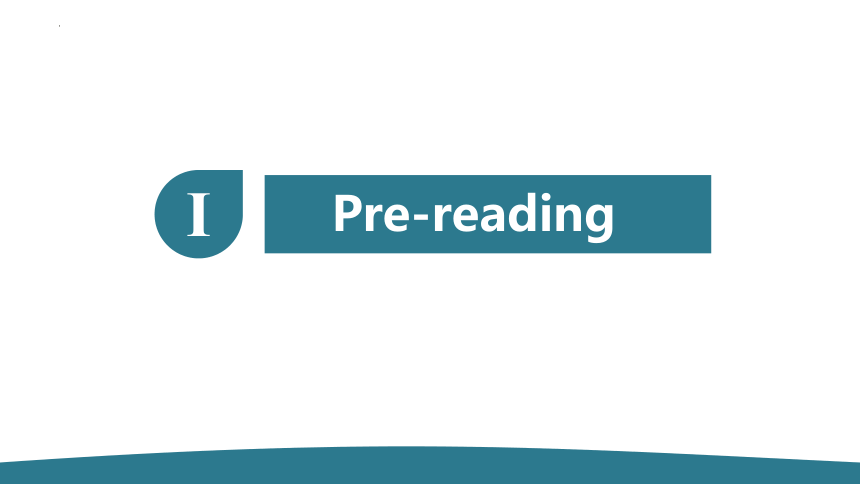
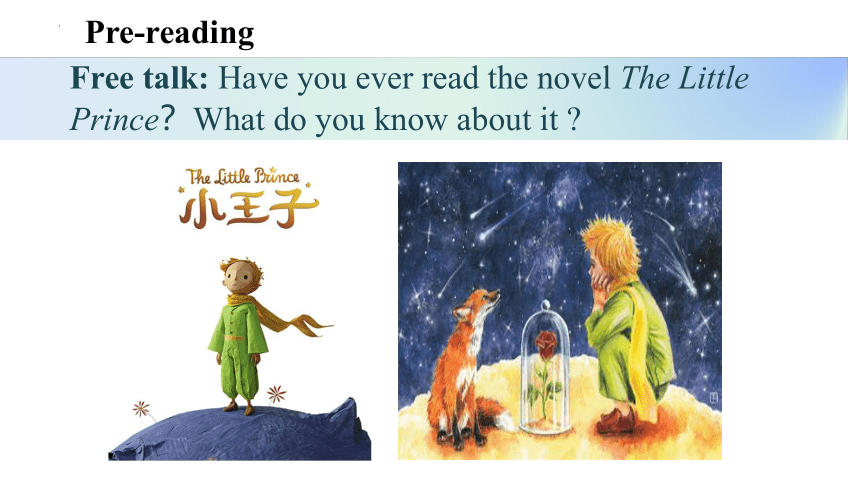
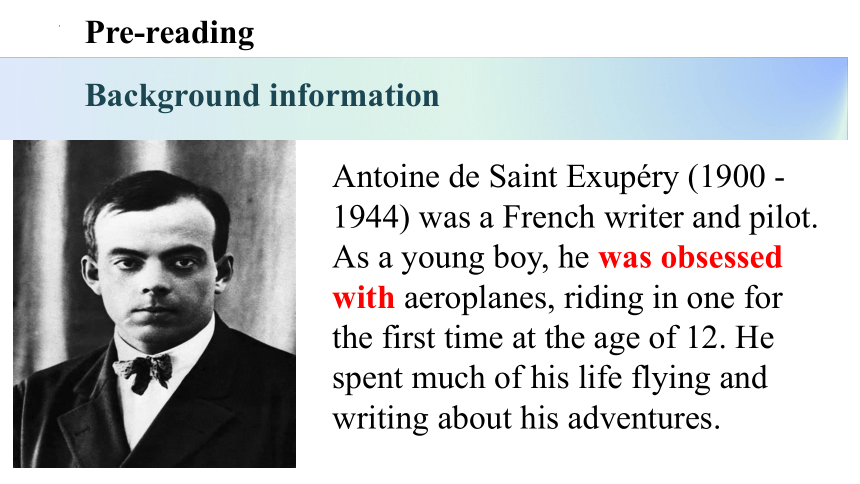
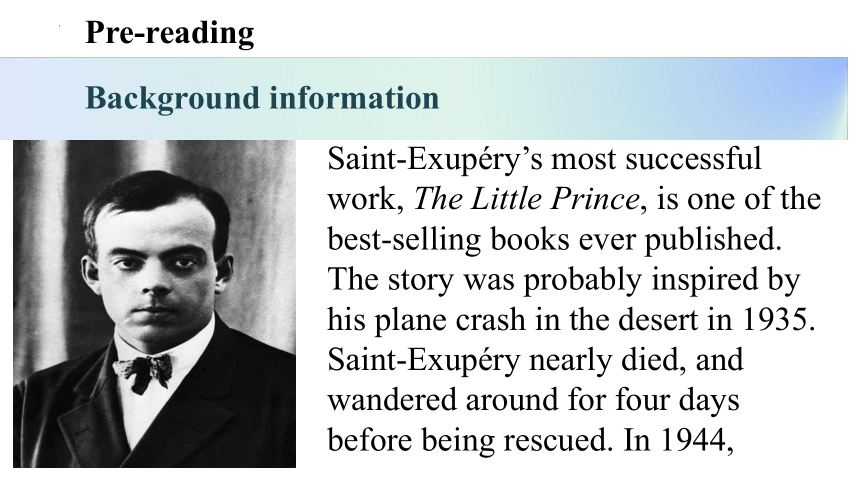
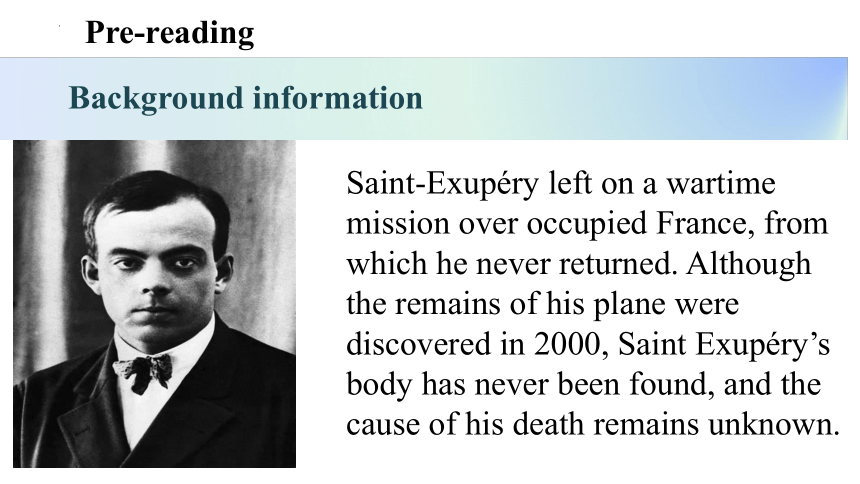
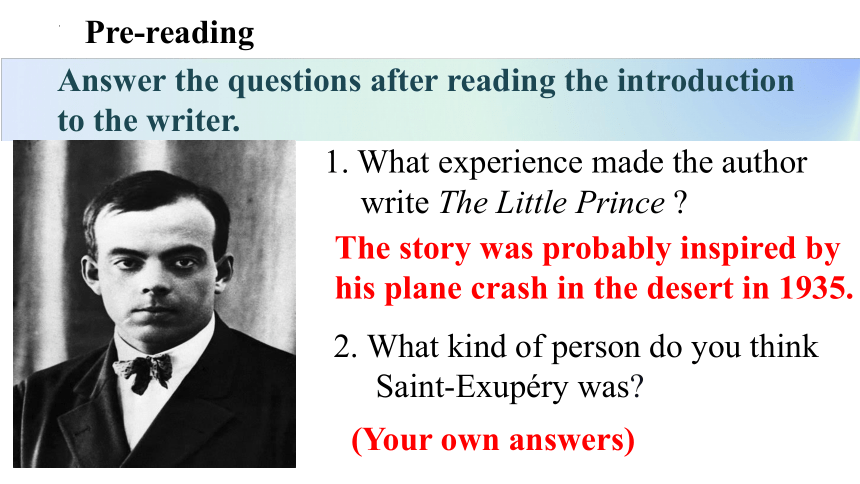
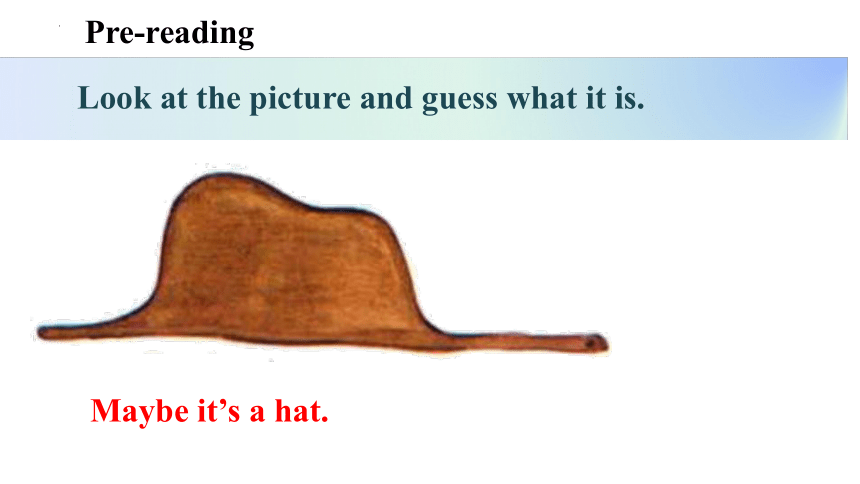
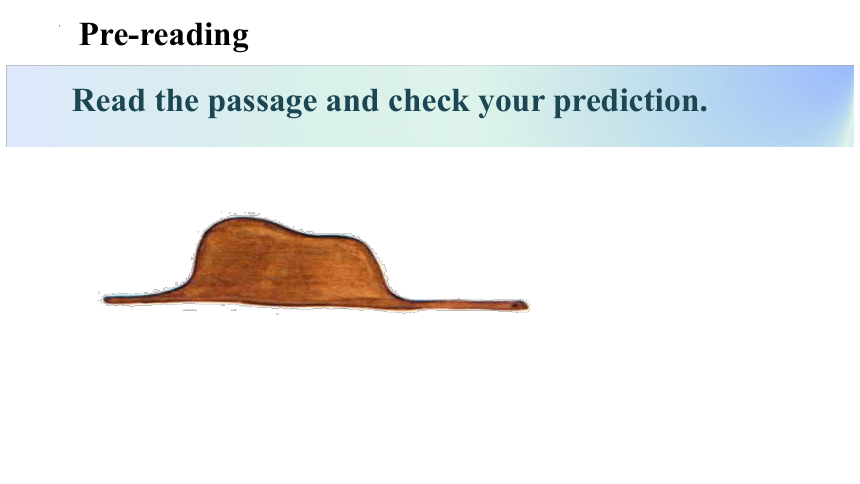
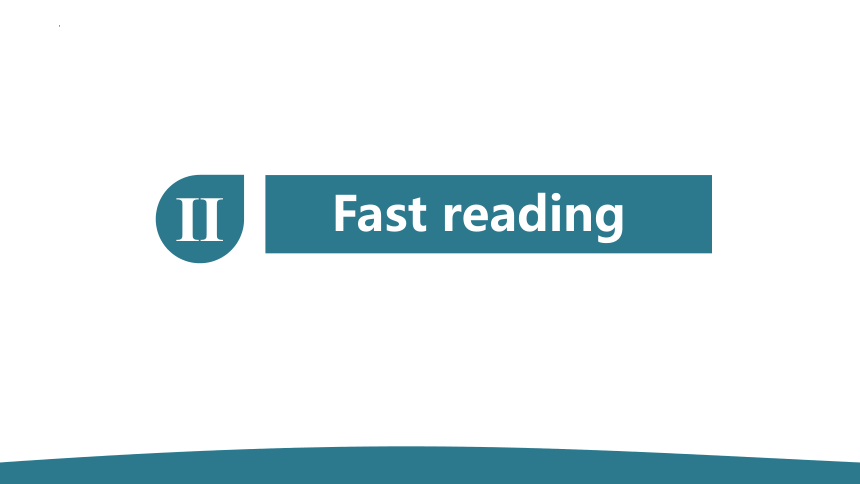
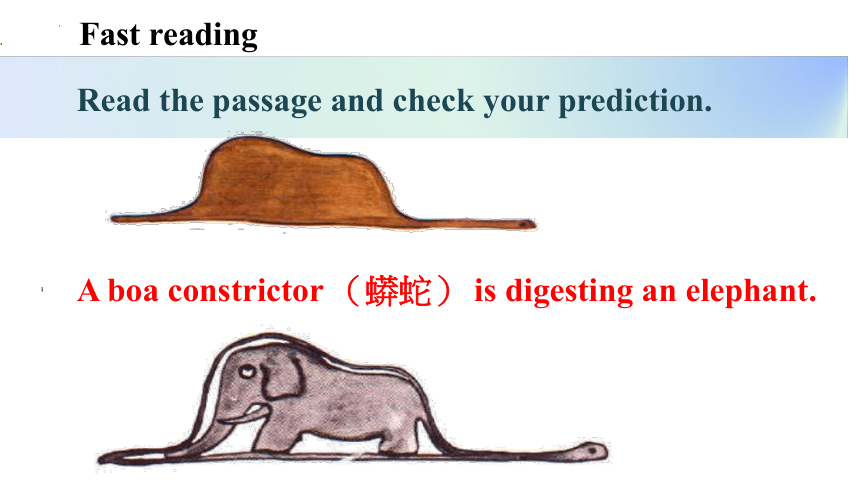
文档简介
(共48张PPT)
Unit 1 Growing up
Developing ideas—reading
目录页
contents
Pre-reading
I
Language points
Ⅳ
Fast reading
II
Homework
Ⅴ
Intensive reading
III
VI
Post-reading
Ⅰ
Pre-reading
Free talk: Have you ever read the novel The Little Prince?What do you know about it
Pre-reading
Background information
Antoine de Saint Exupéry (1900 - 1944) was a French writer and pilot. As a young boy, he was obsessed with aeroplanes, riding in one for the first time at the age of 12. He spent much of his life flying and writing about his adventures.
Pre-reading
Background information
Saint-Exupéry’s most successful work, The Little Prince, is one of the best-selling books ever published. The story was probably inspired by his plane crash in the desert in 1935. Saint-Exupéry nearly died, and wandered around for four days before being rescued. In 1944,
Pre-reading
Background information
Saint-Exupéry left on a wartime mission over occupied France, from which he never returned. Although the remains of his plane were discovered in 2000, Saint Exupéry’s body has never been found, and the cause of his death remains unknown.
Pre-reading
Answer the questions after reading the introduction to the writer.
1. What experience made the author write The Little Prince
The story was probably inspired by his plane crash in the desert in 1935.
(Your own answers)
Pre-reading
2. What kind of person do you think
Saint-Exupéry was
Look at the picture and guess what it is.
Maybe it’s a hat.
Pre-reading
Read the passage and check your prediction.
Pre-reading
Ⅱ
Fast reading
Read the passage and check your prediction.
A boa constrictor (蟒蛇) is digesting an elephant.
Fast reading
III
Intensive reading
Intensive reading: Find detailed information
Task 1: Read the passage and find out the
information and fill in the diagram.
The first picture:
A picture of a boa constrictor in the act of ___________________.
swallowing an animal
Intensive reading: Find detailed information
a boa constrictor digesting an elephant
a hat
My first
drawing:
author: a picture of __________________________________.
grown-ups: ___________.
Intensive reading: Find detailed information
My second drawing:
grown-ups:
lay aside ____________________________ ____________________________________.
my drawings of boa constrictors,
whether from the inside or the outside
author: inside of _________________.
the boa constrictor
Intensive reading: Find detailed information
Task 2: Have a discussion with your classmates about why the author and the grown-ups have different ideas.
Because they have different perspectives on the world. Children understand the world by senses, so they are more creative and imaginative; while the grown-ups are more knowledgeable and experienced, so they are limited and reasonable — literally.
Intensive reading: Find detailed information
Task 3: Choose the author’s attitude towards grown-ups and find evidence to support your choice.
Grown-ups are more practical than children. They want
to teach children knowledge that will be useful in the
future.
2. Grown-ups are no better than children. They lack
imagination and only care about matters of consequence.
3. Grown-ups are more knowledgeable than children. They
can understand everything by themselves.
Intensive reading: Find detailed information
Evidence:
1. They always need to have things explained. (Para 6)
2. Grown-ups never understand anything by themselves, and it is tiresome for children to be always and forever explaining things to them. (Para 7)
3. …, I have had a great many encounters with a great many people who have been concerned with matters of consequence. (Para 9)
Intensive reading: Find detailed information
Evidence:
4. I would bring myself down to his level. I would talk to him about bridge, and golf, and politics, and neckties. And the grown-up would be greatly pleased to have met such a sensible man. (Para 12)
Ⅳ
Post-reading
Read the sentences from the passage and answer the questions.
Post-reading
Q1: What does the author really mean by these sentences
Q2: What figure of speech does the author use How does this figure of speech help to express the author’s attitude
0,ple reading my blog! b I love to photograph the rising sun, …
… I have had a great many encounters with a great many people who have been concerned with matters of consequence.
And the grown-up would be greatly pleased to have met such a sensible man.
Post-reading
Q1: What does the author really mean by these sentences
Most of the adults I have met are the same. They focus on practical matters only and seldom pay attention to imagination or creativity. If I pretend to think the way they do, the adults will conclude that I am sensible and mature.
Post-reading
Q2: What figure of speech does the author use How does this figure of speech help to express the author’s attitude
Irony(讽刺,反语).
This figure of speech enables the author to indicate his low opinion of adults’ behavior and values by stressing such things.
Post-reading
Learning to learn
Irony is a subtle figure of speech that refers to things one says that are the opposite of what one really means. It has a humorous, emphatic or sarcastic effect.
For example: Fine, don’t buy me an airline ticket. I’ll just swim across the ocean!
Post-reading
They thought the author’s Drawing Number One was just about an ordinary hat. When seeing the author’s Drawing Number Two, they advised the author to change his focus to other subjects such as geography, history, arithmetic and grammar.
Because they lack imagination and patience and just focus on the consequences of matters.
Think and share
1. What were the grown-ups’ responses to the author’s Drawing Number One and Drawing Number Two Why do you think they responded in this way
Post-reading
Imagination and genuineness.
According to the author, what is a child’s most valuable trait
Think and share
Post-reading
After reading the two passages in this unit, I have learnt a lot. Being a child or an adult may have its own advantages and disadvantages. As far as I am concerned, being a child is much happier because I don’t take a lot of responsibilities, and I must be taken good care of by my parents, although I have to be supervised by them as well. Being an adult means
3. After reading the two passages in this unit, what can you acquire and lose as you grow up
Think and share
Post-reading
3. After reading the two passages in this unit, what can you acquire and lose as you grow up
Think and share
I will be allowed to do a lot of things that I can’t when I was a child, while I must be mature and strong enough to take responsibilities.
Above all, I can acquire a lot; meanwhile, I may also lose something precious as I grow up. So I hope I will keep a childlike innocence deep in my heart.
Post-reading
1. Decide whether you agree with the author’s attitude towards grown-ups and why.
2. Think of some examples and make notes.
3. Organise your talk following the steps below.
Explain the author’s attitude towards grown-ups.
State your own opinions.
Give supporting examples.
Conclude by summarising your opinions.
Work in groups. Give a talk about your attitude towards grown-ups.
Post-reading
I totally agree with the author because ... /
I don’t agree with the author because ...
(2) In my view ... / In my eyes ... / Personally, I think ...
(3) Take ... for example ... / For instance ...
(4) To conclude ... / To sum up ... / All in all ...
Useful expressions:
4. Give your talk to the class.
Work in groups. Give a talk about your attitude towards grown-ups.
Post-reading
If you love a flower that lives on a star, it is sweet to look at the sky at night. All the stars are abloom with flowers ...
如果你爱上了一朵生长在一颗星星上的花,那么夜间你看着天空就感到甜蜜愉快。所有的星星上都好像开着花。
Post-reading
If you tame me, then we shall need each other. To me, you will be unique in all the world. To you, I shall be unique in all the world.
假如你驯养了我,我们就彼此需要了。对我而言,你就是举世无双的; 对你而言,我也是独一无二的 ……
Language points
Ⅴ
Language points: Important lexical chunks
1. swallow one’s prey whole
2. lay aside
3. devote oneself to doing
4. at a glance
5. distinguish A from B
囫囵吞下猎物
把……搁置一边
致力于,献身于
一瞥,看一眼
区分A和B
Language points: Important lexical chunks
6. in the course of ...
7. be concerned with...
8. close at hand
9. a great many
10. ponder over / about / on ...
关注……
就在眼前;在附近
许多,很多
在……期间
仔细考虑
Language points: Important sentences
1. Boa constrictors _________ their prey whole, _____ ________________ it. After that they are not able to move, and they _____________ the six months that they need for _____________. (Line 1, Para 2)
swallow
without chewing
sleep through
digestion
Paraphrase: Boa constrictors let the entire animal they have hunted go down their throats without biting it into smaller pieces. Afterwards, they can’t move because their stomachs are filled up, and they have to sleep for six months to change the food into substances their bodies can use.
Language points: Important sentences
swallow, chew 及 digestion 均与饮食有关,分别意为“吞咽”“咀嚼”与“消化”。
sleep through 意为 to sleep for a long time without waking up。
e.g. The baby slept peacefully through the night.
Language points: Important sentences
2. The grown-ups’ response, this time, was to advise me to my drawings of boa constrictors,
___________________________________ , and devote myself instead to geography, history, arithmetic and grammar. (Line 1, Para 7)
lay aside
whether from the inside or the outside
Paraphrase: This time, the adults advised me to stop my strange thoughts and paintings. In their opinion, I should pay more attention to useful subjects such as geography, history, arithmetic and grammar.
Language points: Important sentences
lay aside 意为“把……搁置一边”。
e.g. Jane had laid aside her book to watch what was happening.
whether from the inside or the outside 为插入语,对上文进行补充说明与解释,不影响整个句子的结构。常见的插入语有形容词(短语)、副词(短语)、介词短语、非谓语动词(短语)、分句等。
e.g. Yes, indeed, I intend to go.
You may, if you please, come and join us in the game.
Language points: Important sentences
3. Grown-ups never understand anything by themselves, and ___________________________________________
_______________________.
it is tiresome for children to be always and forever
(Line 4 to the last, Para 7)
Paraphrase: Adults can’t always understand the world of children, so children feel tired and bored when they have to explain their thoughts to adults again and again.
it’s tiresome for sb to do sth 意为“某人厌烦去做某事”,句中it是形式主语,to do结构为真正的主语。
e.g. It is important for you to get there on time.
explaining things to them
Language points: Important sentences
4. In the course of this life, I have had ____________ encounters with people who have been concerned with matters of consequence. I have lived a great deal among grown-ups. I have seen them intimately, close at hand. And that hasn’t much improved my opinion of them.
a great many
a great many
Language points: Important sentences
Paraphrase: In my life, I have met a lot of adults. Adults focus on things that they think very important, but which aren’t really. I have spent a lot of time living with adults and know them very well. My experience of living with adults has given me a low opinion of them.
Language points: Important sentences
a great many = a large number of / many / lots of / plenty of, 意为“很多”。需要注意的是,a great many 后接可数名词的复数形式,谓语动词也用复数形式。
e.g. He’s been to a great many places.
文章中两次使用 a great many, 是为了强调作者对成年人的看法是有依据的,也为后文的观点埋下了伏笔。
Language points: Important sentences
5. I would bring myself down to his level. I would talk to him about bridge, and golf, and politics, and neckties. And the grown-up would be greatly pleased to have met such a sensible man. (Line 3, Para 12)
Paraphrase: I would lower myself to the same level as the adult and talk to them about the things they are interested in. Then they would be satisfied and pleased to meet such a smart person as me.
Language points: Important sentences
此处用了反讽的修辞手法。作者表示愿意迎合成年人,讲他们感兴趣的东西,实则是想表达成年人根本不懂儿童的世界,他们只是故作聪明罢了。
e.g. It must be delightful to find oneself in a foreign
country without a penny in one’s pocket.
(发现自己身处异国却身无分文,一定很高兴吧。)
VI
Homework
Homework
Collect more examples of using irony in English.
Read the passage fluently after class.
Unit 1 Growing up
Developing ideas—reading
目录页
contents
Pre-reading
I
Language points
Ⅳ
Fast reading
II
Homework
Ⅴ
Intensive reading
III
VI
Post-reading
Ⅰ
Pre-reading
Free talk: Have you ever read the novel The Little Prince?What do you know about it
Pre-reading
Background information
Antoine de Saint Exupéry (1900 - 1944) was a French writer and pilot. As a young boy, he was obsessed with aeroplanes, riding in one for the first time at the age of 12. He spent much of his life flying and writing about his adventures.
Pre-reading
Background information
Saint-Exupéry’s most successful work, The Little Prince, is one of the best-selling books ever published. The story was probably inspired by his plane crash in the desert in 1935. Saint-Exupéry nearly died, and wandered around for four days before being rescued. In 1944,
Pre-reading
Background information
Saint-Exupéry left on a wartime mission over occupied France, from which he never returned. Although the remains of his plane were discovered in 2000, Saint Exupéry’s body has never been found, and the cause of his death remains unknown.
Pre-reading
Answer the questions after reading the introduction to the writer.
1. What experience made the author write The Little Prince
The story was probably inspired by his plane crash in the desert in 1935.
(Your own answers)
Pre-reading
2. What kind of person do you think
Saint-Exupéry was
Look at the picture and guess what it is.
Maybe it’s a hat.
Pre-reading
Read the passage and check your prediction.
Pre-reading
Ⅱ
Fast reading
Read the passage and check your prediction.
A boa constrictor (蟒蛇) is digesting an elephant.
Fast reading
III
Intensive reading
Intensive reading: Find detailed information
Task 1: Read the passage and find out the
information and fill in the diagram.
The first picture:
A picture of a boa constrictor in the act of ___________________.
swallowing an animal
Intensive reading: Find detailed information
a boa constrictor digesting an elephant
a hat
My first
drawing:
author: a picture of __________________________________.
grown-ups: ___________.
Intensive reading: Find detailed information
My second drawing:
grown-ups:
lay aside ____________________________ ____________________________________.
my drawings of boa constrictors,
whether from the inside or the outside
author: inside of _________________.
the boa constrictor
Intensive reading: Find detailed information
Task 2: Have a discussion with your classmates about why the author and the grown-ups have different ideas.
Because they have different perspectives on the world. Children understand the world by senses, so they are more creative and imaginative; while the grown-ups are more knowledgeable and experienced, so they are limited and reasonable — literally.
Intensive reading: Find detailed information
Task 3: Choose the author’s attitude towards grown-ups and find evidence to support your choice.
Grown-ups are more practical than children. They want
to teach children knowledge that will be useful in the
future.
2. Grown-ups are no better than children. They lack
imagination and only care about matters of consequence.
3. Grown-ups are more knowledgeable than children. They
can understand everything by themselves.
Intensive reading: Find detailed information
Evidence:
1. They always need to have things explained. (Para 6)
2. Grown-ups never understand anything by themselves, and it is tiresome for children to be always and forever explaining things to them. (Para 7)
3. …, I have had a great many encounters with a great many people who have been concerned with matters of consequence. (Para 9)
Intensive reading: Find detailed information
Evidence:
4. I would bring myself down to his level. I would talk to him about bridge, and golf, and politics, and neckties. And the grown-up would be greatly pleased to have met such a sensible man. (Para 12)
Ⅳ
Post-reading
Read the sentences from the passage and answer the questions.
Post-reading
Q1: What does the author really mean by these sentences
Q2: What figure of speech does the author use How does this figure of speech help to express the author’s attitude
0,ple reading my blog! b I love to photograph the rising sun, …
… I have had a great many encounters with a great many people who have been concerned with matters of consequence.
And the grown-up would be greatly pleased to have met such a sensible man.
Post-reading
Q1: What does the author really mean by these sentences
Most of the adults I have met are the same. They focus on practical matters only and seldom pay attention to imagination or creativity. If I pretend to think the way they do, the adults will conclude that I am sensible and mature.
Post-reading
Q2: What figure of speech does the author use How does this figure of speech help to express the author’s attitude
Irony(讽刺,反语).
This figure of speech enables the author to indicate his low opinion of adults’ behavior and values by stressing such things.
Post-reading
Learning to learn
Irony is a subtle figure of speech that refers to things one says that are the opposite of what one really means. It has a humorous, emphatic or sarcastic effect.
For example: Fine, don’t buy me an airline ticket. I’ll just swim across the ocean!
Post-reading
They thought the author’s Drawing Number One was just about an ordinary hat. When seeing the author’s Drawing Number Two, they advised the author to change his focus to other subjects such as geography, history, arithmetic and grammar.
Because they lack imagination and patience and just focus on the consequences of matters.
Think and share
1. What were the grown-ups’ responses to the author’s Drawing Number One and Drawing Number Two Why do you think they responded in this way
Post-reading
Imagination and genuineness.
According to the author, what is a child’s most valuable trait
Think and share
Post-reading
After reading the two passages in this unit, I have learnt a lot. Being a child or an adult may have its own advantages and disadvantages. As far as I am concerned, being a child is much happier because I don’t take a lot of responsibilities, and I must be taken good care of by my parents, although I have to be supervised by them as well. Being an adult means
3. After reading the two passages in this unit, what can you acquire and lose as you grow up
Think and share
Post-reading
3. After reading the two passages in this unit, what can you acquire and lose as you grow up
Think and share
I will be allowed to do a lot of things that I can’t when I was a child, while I must be mature and strong enough to take responsibilities.
Above all, I can acquire a lot; meanwhile, I may also lose something precious as I grow up. So I hope I will keep a childlike innocence deep in my heart.
Post-reading
1. Decide whether you agree with the author’s attitude towards grown-ups and why.
2. Think of some examples and make notes.
3. Organise your talk following the steps below.
Explain the author’s attitude towards grown-ups.
State your own opinions.
Give supporting examples.
Conclude by summarising your opinions.
Work in groups. Give a talk about your attitude towards grown-ups.
Post-reading
I totally agree with the author because ... /
I don’t agree with the author because ...
(2) In my view ... / In my eyes ... / Personally, I think ...
(3) Take ... for example ... / For instance ...
(4) To conclude ... / To sum up ... / All in all ...
Useful expressions:
4. Give your talk to the class.
Work in groups. Give a talk about your attitude towards grown-ups.
Post-reading
If you love a flower that lives on a star, it is sweet to look at the sky at night. All the stars are abloom with flowers ...
如果你爱上了一朵生长在一颗星星上的花,那么夜间你看着天空就感到甜蜜愉快。所有的星星上都好像开着花。
Post-reading
If you tame me, then we shall need each other. To me, you will be unique in all the world. To you, I shall be unique in all the world.
假如你驯养了我,我们就彼此需要了。对我而言,你就是举世无双的; 对你而言,我也是独一无二的 ……
Language points
Ⅴ
Language points: Important lexical chunks
1. swallow one’s prey whole
2. lay aside
3. devote oneself to doing
4. at a glance
5. distinguish A from B
囫囵吞下猎物
把……搁置一边
致力于,献身于
一瞥,看一眼
区分A和B
Language points: Important lexical chunks
6. in the course of ...
7. be concerned with...
8. close at hand
9. a great many
10. ponder over / about / on ...
关注……
就在眼前;在附近
许多,很多
在……期间
仔细考虑
Language points: Important sentences
1. Boa constrictors _________ their prey whole, _____ ________________ it. After that they are not able to move, and they _____________ the six months that they need for _____________. (Line 1, Para 2)
swallow
without chewing
sleep through
digestion
Paraphrase: Boa constrictors let the entire animal they have hunted go down their throats without biting it into smaller pieces. Afterwards, they can’t move because their stomachs are filled up, and they have to sleep for six months to change the food into substances their bodies can use.
Language points: Important sentences
swallow, chew 及 digestion 均与饮食有关,分别意为“吞咽”“咀嚼”与“消化”。
sleep through 意为 to sleep for a long time without waking up。
e.g. The baby slept peacefully through the night.
Language points: Important sentences
2. The grown-ups’ response, this time, was to advise me to my drawings of boa constrictors,
___________________________________ , and devote myself instead to geography, history, arithmetic and grammar. (Line 1, Para 7)
lay aside
whether from the inside or the outside
Paraphrase: This time, the adults advised me to stop my strange thoughts and paintings. In their opinion, I should pay more attention to useful subjects such as geography, history, arithmetic and grammar.
Language points: Important sentences
lay aside 意为“把……搁置一边”。
e.g. Jane had laid aside her book to watch what was happening.
whether from the inside or the outside 为插入语,对上文进行补充说明与解释,不影响整个句子的结构。常见的插入语有形容词(短语)、副词(短语)、介词短语、非谓语动词(短语)、分句等。
e.g. Yes, indeed, I intend to go.
You may, if you please, come and join us in the game.
Language points: Important sentences
3. Grown-ups never understand anything by themselves, and ___________________________________________
_______________________.
it is tiresome for children to be always and forever
(Line 4 to the last, Para 7)
Paraphrase: Adults can’t always understand the world of children, so children feel tired and bored when they have to explain their thoughts to adults again and again.
it’s tiresome for sb to do sth 意为“某人厌烦去做某事”,句中it是形式主语,to do结构为真正的主语。
e.g. It is important for you to get there on time.
explaining things to them
Language points: Important sentences
4. In the course of this life, I have had ____________ encounters with people who have been concerned with matters of consequence. I have lived a great deal among grown-ups. I have seen them intimately, close at hand. And that hasn’t much improved my opinion of them.
a great many
a great many
Language points: Important sentences
Paraphrase: In my life, I have met a lot of adults. Adults focus on things that they think very important, but which aren’t really. I have spent a lot of time living with adults and know them very well. My experience of living with adults has given me a low opinion of them.
Language points: Important sentences
a great many = a large number of / many / lots of / plenty of, 意为“很多”。需要注意的是,a great many 后接可数名词的复数形式,谓语动词也用复数形式。
e.g. He’s been to a great many places.
文章中两次使用 a great many, 是为了强调作者对成年人的看法是有依据的,也为后文的观点埋下了伏笔。
Language points: Important sentences
5. I would bring myself down to his level. I would talk to him about bridge, and golf, and politics, and neckties. And the grown-up would be greatly pleased to have met such a sensible man. (Line 3, Para 12)
Paraphrase: I would lower myself to the same level as the adult and talk to them about the things they are interested in. Then they would be satisfied and pleased to meet such a smart person as me.
Language points: Important sentences
此处用了反讽的修辞手法。作者表示愿意迎合成年人,讲他们感兴趣的东西,实则是想表达成年人根本不懂儿童的世界,他们只是故作聪明罢了。
e.g. It must be delightful to find oneself in a foreign
country without a penny in one’s pocket.
(发现自己身处异国却身无分文,一定很高兴吧。)
VI
Homework
Homework
Collect more examples of using irony in English.
Read the passage fluently after class.
